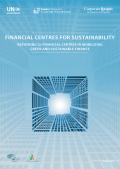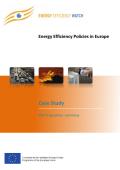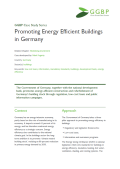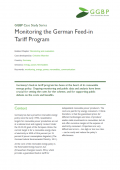


The German state-owned Bank for Reconstruction (Germ.: Kreditanstalt für Wiederaufbau, KfW) manages two programmes to improve the energy efficiency of German residential buildings through the “energy efficiency programme – energy-efficient construction and refurbishment”. The two programmes are (i) energy efficient construction (EEC) and (ii) energy efficient renovation (EER). While the...

The Government of Germany, together with the national development bank, promotes energy-efficient construction and refurbishment of Germany’s building stock through regulation, low-cost loans and public information campaigns.

Germany’s feed-in tariff program has been at the heart of its renewable energy policy. Ongoing monitoring and public data and analysis have been crucial for setting the rates for the scheme, and for supporting public debate on the costs and benefits.
